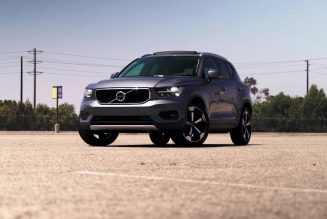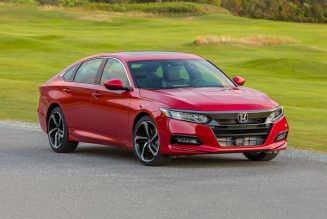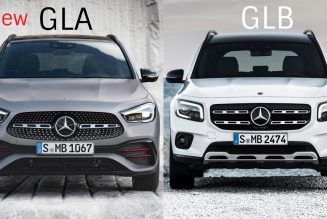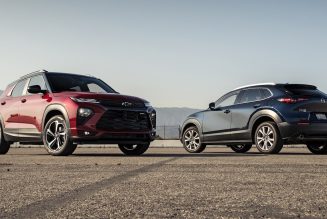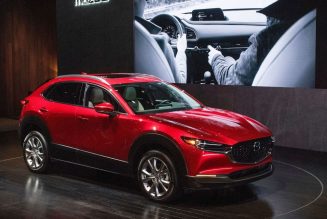Before the current millennium started, minivans were America’s must-have family vehicles. For nearly two decades their versatility, interior space, and comfort features attracted families. But the arrival of boxy three-row crossover SUVs—with their unibody platforms, appealing designs, and all-wheel-drive capability—replaced minivans little by little. In the last 15 years or so, about a dozen minivan nameplates hit the guillotine, and during that time more than 10 three-row SUVs hit the marketplace. But minivans are not completely dead—Chrysler, Honda, Toyota, and Kia continue to invest in the segment, launching new models that are keeping families comfortable, entertained, and safe. The 2021 Chrysler Pacifica Hybrid and 2021 Toyota Sienna are currently the only two gasoline-electric hybrid minivans on the market, and both not only save their owners money at the pump but continue to cater to the needs of families.
Although the pair aims to please with technology and comfort amenities, the two vans do it in different ways. The Pacifica is a plug-in hybrid that promises just over 30 miles of pure electric driving range, whereas the Sienna is powered by a traditional gasoline-electric hybrid powertrain (small battery pack, no plug) that promises more than 500 miles of total driving range. The Chrysler has gotten a face-lift for the 2021 model year and still offers a standard gas-only powertrain with a new all-wheel-drive option; the Toyota is entering its fourth generation, this time as a hybrid only. It also offers the option of front- or all-wheel-drive.


For the purposes of this comparison, we went all-in and requested the top trim front-drive models. The new Pacifica Hybrid Pinnacle competes head-to-head with the Sienna Platinum. Both trims are new for their respective models and try to stand out with rich interior materials and loads of features. What does that mean for the segment? Are minivans going all-luxe?
2021 Chrysler Pacifica Hybrid vs. 2021 Toyota Sienna: The Matchup
Using a 2.5-liter four-cylinder engine mated to two electric motors (one of which manages the van’s e-CVT), the 2021 Toyota Sienna produces 245 hp combined. The all-wheel-drive option means the Sienna is currently the only minivan that combines a hybrid powertrain with an all-wheel-drive system. Our front-drive Sienna Platinum delivers 36 mpg across the board, and all-wheel-drive models drop 1 mpg on city and combined driving. Compared to the outgoing Sienna, which was powered by a V-6 engine and delivered 51 hp more, the new minivan betters its predecessor’s fuel economy by an eye-popping 10-17 mpg—enough to see moderate savings in your wallet.
Our loaded Platinum came with a long list of standard features, including the fancy heated second-row captain’s chairs with built-in ottomans, which can slide back 25 inches to offer a limolike experience. With a base price of $51,075, the Platinum has a lot to offer. Our test van came with the optional intelligent rear-view mirror ($200) and the A/C inverter and power outlets ($300), raising its price to $51,575.
The Pacifica Pinnacle Hybrid’s powertrain remains unchanged from last year, which means that its 3.6-liter V-6 mated to a couple of electric motors continues to deliver 260 hp; a CVT sends the power to the front wheels only. Chrysler has not revealed the fuel economy numbers for its updated hybrid minivan, but the pre-refresh model delivers 29/30/30 mpg in charge-sustaining (gas-only) mode; 87/76/82 mpg-e in charge-depleting gas+electric mode. We might see some changes once the actual ratings from the EPA come out, but given that the powertrain carries over from the 2020 model, we don’t expect anything much different.
Pacifica Pinnacles come loaded with all the bells and whistles, including a rear-seat entertainment package that not only adds individual screens for second-row passengers but also fits 11 USB ports across all three rows. Crossing the checkout counter at $52,340, our Pinnacle Hybrid came with sumptuous standard equipment, including the brand’s new Uconnect 5 infotainment screen, fancy quilted leather seats with pillows, and a panoramic sunroof.
Chrysler Pacifica Hybrid vs. Toyota Sienna: Inside
Enter the Pacifica Pinnacle, and you’ll be wowed by its rich interior. The caramel-colored quilted leather seats give a great first impression and, combined with the black leather and wood touches around the cabin, will make you feel like you’re riding in something special. Drivers are greeted by a 7.0-inch digital cluster that sits in between two analog gauges, displaying important info such as the range and battery levels. But the new 10.1-inch touchscreen with Uconnect 5 is what gets most of the attention. We’ve loved past Uconnect systems, and the upgraded setup brings new graphics, faster responses, and wireless Apple CarPlay and Android Auto compatibility. Differentiating itself from the rest of the Pacifica lineup, the Pinnacle comes with a new center console that provides a sort of two-level storage area with a tray on top and open space on the bottom. That center console also has a small drawer accessible to passengers sitting in the second row, adding extra storage space and two cupholders.
Those sitting in the second and third rows have plenty of headroom and legroom. Getting into the third row is easy, whether walking between the two captain’s chairs or by lifting a handle on the shoulders of said chairs to slide them forward. But the Pacifica’s awkward seating position in the second and third rows was evident thanks to the floor being a bit higher—our knees were higher up, and we noticed less thigh support from the bottom cushions compared to the Sienna’s seats. The hybrid battery takes the place of the in-floor storage in the second row that’s part of the non-hybrid Pacifica’s popular Stow-n-Go seating option, so even though you lose the seats’ ability to stow within the floorboard, you still have the high floor. At least the rear-seat entertainment and the panoramic sunroof make the ride more entertaining.
Those traveling in the Sienna will feel as though they are sitting in a living room. The lavish features are not as extravagant in the second and third rows. Toyota doesn’t offer a panoramic sunroof, and the rear-seat entertainment package costs $1,415, which includes a single 11.6-inch screen on the ceiling. The third-row windows are tiny, making the ride somewhat claustrophobic.
All Siennas come with seven USB ports, and the Platinum model adds a wireless charger in the front. Despite its lack of swanky features, the Sienna offers the best seats in the industry. With the second-row captain’s chairs in their aftmost position, there’s enough legroom to make any kind of road trip comfortable. And with the ottomans up and the seatback reclined, the kids (and parents) will feel like they’re riding in a big Rolls-Royce. As in previous generations, the Sienna comes with a built-in refrigerator, which can keep food and drinks chilled. Both vans offer a built-in vacuum to pick up the crumbs kids leave behind, and after testing each we preferred the stronger suction of the Toyota’s.
Where the Sienna stands out is in the front. The tray that runs along the front passenger’s area of the dashboard is a great spot to place your belongings, and the bridgelike center console offers more space and usability than the Pacifica’s. Items such as a large purse can fit under the center console, and the deep storage compartment between the driver and front passenger can store a couple of iPads. Four of the 16 cupholders are smartly located on the front center console, and the one closest to the dashboard was designed to place your smartphone in an upright position that’s visible to the driver. Unlike the upgraded infotainment system in the Pacifica, the Sienna’s system is outdated. Toyota really needs to step up its game here—the graphics look like they’re from the time when the Motorola Razr was hip, and although Apple CarPlay and Android Auto are standard, the system feels ancient.
2021 Chrysler Pacifica Hybrid vs. 2021 Toyota Sienna: The Drive
Although the way they drive is not as critical as their interior space and comfort, the way minivans handle is an important part of their mission.


After driving the Pacifica Hybrid and Sienna back to back over the same roads and highways, the Chrysler’s ride quality stood out over the Toyota’s. Although the Pacifica received only a midcycle refresh, engineers took the time and effort to go the extra mile and improve its behavior on the road. Most notable is the quietness in the cabin, which improves thanks to the use of acoustic glass forward of the B-pillars, and more soundproofing materials. The Pacifica’s interior should bring peace to parents after dropping off their kids at school while the suspension tuning delivers a comfortable ride. This doesn’t mean that the Sienna’s cabin is noisy, but there was a clear difference when driving both minivans back to back.
Although the new Sienna adopts a rear independent suspension, which should deliver a nicer ride, the Toyota felt like it was riding on its tiptoes—we felt bumps we didn’t notice in the Pacifica. The Chrysler shined with its settled ride, and only the big ruts bothered it.
“The body seems well isolated from the suspension except for over larger, sharper impacts, which it still deals with well even if it can’t erase them entirely,” associate online editor Alex Leanse said. The Sienna Platinum’s 20-inch wheels and tires also didn’t help; we later drove a Sienna LE with 17-inch wheels and tires that rode better. (The Pacifica Pinnacle is available with 20-inch wheels and tires, but our model was equipped with 18-inchers.)
In terms of punchiness, the two vans were neck and neck. Both minivans hit 60 mph in 7.9 seconds and completed the quarter mile in 16.1 seconds, with the Sienna crossing the line at 88.3 mph and the Pacifica at 88.0 mph. On the street, however, the pair behaved pretty differently. The Toyota’s engine felt stressed under mid throttle, something we don’t remember experiencing in the three-row Highlander Hybrid, which shares its engine and platform with the Sienna.
“Good electric pickup, accompanied by a noisy, thrashy powertrain,” Leanse said. “Plenty of that vibration and harshness makes its way into the cabin.” The Pacifica Hybrid is not much smoother, but it doesn’t feel as stressed as the Sienna. The electric motors’ torque kicks in first, and when the gas engine picks up there’s a loud roar that comes with it (and not in a good way).
The steering feel on both minivans is softer than our liking, but the Sienna’s felt more accurate than the Pacifica’s, giving more feedback of what was happening at the wheels.
2021 Chrysler Pacifica Hybrid vs. 2021 Toyota Sienna: Versatility and Safety


Whether you’re running to Home Depot or simply need more cargo room for long road trips, the Pacifica Hybrid provides a bit more versatility. That’s because the second-row seats can are removable, whereas the Sienna middle row only slides and folds to the front. (Because of the in-seat side airbags, the Sienna’s second-row seats cannot be removed for safety reasons.) Although the magnificent Stow n’ Go seats are not available in the Pacifica Hybrid, you can remove the second-row seats if you need to. The task is difficult given the bulkiness of the chairs, but once out, there is plenty of cargo room. Toyota says that a 4×6 sheet of plywood fits in the Sienna, but it will have to rest on the second-row headrests.
Both third rows fold flat, but it’s easier to fold them in the Sienna. Toyota reduced the weight of the third-row seats by 50 percent, and now you can fold or put them in their upright position with one hand. The Pacifica’s seats are a bit heavier, which makes them harder to fold.
The Sienna and Pacifica are both equipped with multiple safety technologies that are meant to take stress off the driver. After driving them back to back, the Sienna stood out over the Pacifica, as it stayed centered in its lane without bouncing from side to side. Also, the Sienna has 10 airbags standard, the most in the segment and two more (second-row side airbags) than the Pacifica.
2021 Chrysler Pacifica Hybrid vs. 2021 Toyota Sienna: Value
These two vans are close in terms of pricing, but that doesn’t mean they have the same value. Although the Sienna has a great interior full of helpful features, the Pacifica Pinnacle gives families more bang for their buck. With the rear-seat entertainment, panoramic moonroof, and a plug-in hybrid powertrain, the Chrysler Pacifica Hybrid hits a sweet spot in terms of what the money can buy.
The Sienna Platinum’s second-row seats and smart convenience features in the front make the cabin a great place for road trips, but it falls short compared to the Pacifica. The materials are lower quality in the Sienna, and the extra cost of the rear-seat entertainment and lack of modern technology and family-friendly features such as the Pacifica’s FamCam set it back in terms of value. Time will tell whether differences in retained value equalizes these competitors.
2021 Chrysler Pacifica Hybrid vs. 2021 Toyota Sienna: Which One Is Better?
Both minivans offer great amenities for families. From the Sienna’s comfort features to the Pacifica’s technology, these family haulers are well positioned in the segment. What’s more, their hybrid powertrains are saving money at the pump while helping make the environment greener. But as we saw in this comparison, they do those things differently.
The Chrysler Pacifica Hybrid takes home the gold. Despite being a midcycle refresh, the Pacifica still has the mojo that got our attention when it first came out. It keeps families entertained while delivering a peaceful ride and a fancy cabin—all while delivering terrific fuel economy. The Toyota Sienna does a lot of things right, including making its hybrid powertrain standard and offering all-wheel drive. But it also has some important misses—the lack of family-friendly technology, the small windows in the third row, and a harsher ride stand out. Its smart convenience features are great, but when we weighed all the plusses and minuses, the Pacifica came out on top.
| POWERTRAIN/CHASSIS | 2021 Chrysler Pacifica Hybrid Pinnacle | 2021 Toyota Sienna Hybrid Platinum |
| DRIVETRAIN LAYOUT | Front-engine, FWD | Front-engine, FWD |
| ENGINE TYPE | Atkinson-cycle 60-deg V-6, alum block/heads, plus electric motors | Atkinson-cycle I-4, alum block/head |
| VALVETRAIN | DOHC, 4 valves/cyl | DOHC, 4 valves/cyl |
| DISPLACEMENT | 220.0 cu in/3,605 cc | 151.8 cu in/2,487 cc |
| COMPRESSION RATIO | 12.5:1 | 14.0:1 |
| POWER (SAE NET) | 220 hp @ 5,500 rpm (gas) + 84 hp (elec 1) + 114 hp (elec 2); 260 hp (comb) | 189 hp @ 6,000 rpm (gas) + 180 hp (elec); 245 hp (comb) |
| TORQUE (SAE NET) | 235 lb-ft @ 3,700 rpm (gas) + 92 lb-ft (elec 1) + 231 lb-ft (elec 2) | 176 lb-ft @ 4,400 rpm (gas) + 199 lb-ft (elec) |
| REDLINE | Not indicated | Not indicated |
| WEIGHT TO POWER | 19.7 lb/hp | 19.2 lb/hp |
| TRANSMISSION | Cont variable auto | Cont variable auto |
| AXLE/FINAL-DRIVE RATIO | 3.59:1/NA | NA |
| SUSPENSION, FRONT; REAR | Struts, coil springs, anti-roll bar; torsion beam, coil springs | Struts, coil springs, anti-roll bar; multilink, coil springs, anti-roll bar |
| STEERING RATIO | 16.2:1 | 14.3:1 |
| TURNS LOCK-TO-LOCK | 3.0 | 3.0 |
| BRAKES, F; R | 13.0-in vented disc; 13.0-in disc, ABS | 12.9-in vented disc; 12.5-in vented disc, ABS |
| WHEELS | 7.5 x 18-in cast aluminum | 7.5 x 20-in cast aluminum |
| TIRES | 235/60R18 103H Michelin Premier A/S (M+S) | 235/50R20 100V Michelin Primacy A/S (M+S) |
| DIMENSIONS | ||
| WHEELBASE | 121.6 in | 120.5 in |
| TRACK, F/R | 68.2/68.2 in | 67.7/68.5 in |
| LENGTH x WIDTH x HEIGHT | 204.3 x 79.6 x 69.9 in | 203.5 x 78.5 x 68.5 in |
| TURNING CIRCLE | 39.7 ft | 39.2 ft |
| CURB WEIGHT | 5,119 lb | 4,714 lb |
| WEIGHT DIST, F/R | 55/45% | 55/45% |
| SEATING CAPACITY | 7 | 7 |
| HEADROOM, F/M/R | 38.4/38.0/38.7 in | 40.1/39.3/34.7 in |
| LEGROOM, F/M/R | 41.1/39.0/36.5 in | 40.3/39.9/38.7 in |
| SHOULDER ROOM, F/M/R | 63.8/63.0/61.2 in | 62.4/62.7/58.5 in |
| CARGO VOLUME BEH F/M/R | 140.5/87.5/32.3 cu ft | 101.0/75.2/33.5 cu ft |
| TEST DATA | ||
| ACCELERATION TO MPH | ||
| 0-30 | 3.0 sec | 2.8 sec |
| 0-40 | 4.3 | 4.2 |
| 0-50 | 5.9 | 5.9 |
| 0-60 | 7.9 | 7.9 |
| 0-70 | 10.3 | 10.3 |
| 0-80 | 13.3 | 13.2 |
| 0-90 | 16.9 | 16.7 |
| PASSING, 45-65 MPH | 4.0 | 4.1 |
| QUARTER MILE | 16.1 sec @ 88.0 mph | 16.1 sec @ 88.3 mph |
| BRAKING, 60-0 MPH | 122 ft | 131 ft |
| LATERAL ACCELERATION | 0.78 g (avg) | 0.75 g (avg) |
| MT FIGURE EIGHT | 27.8 sec @ 0.61 g (avg) | 28.3 sec @ 0.59 g (avg) |
| TOP-GEAR REVS @ 60 MPH | NA rpm | NA rpm |
| CONSUMER INFO | ||
| BASE PRICE | $52,340 | $51,075 |
| PRICE AS TESTED | $52,340 | $51,575 |
| STABILITY/TRACTION CONTROL | Yes/Yes | Yes/Yes |
| AIRBAGS | 8: Dual front, front side, f/m/r curtain, front knee | 10: Dual front, f/m side, f/m/r curtain, driver knee, front passenger thigh |
| BASIC WARRANTY | 3 yrs/36,000 miles | 3 yrs/36,000 miles |
| POWERTRAIN WARRANTY | 5 yrs/60,000 miles, 10/100,000 (battery, hybrid sys) | 5 yrs/60,000 miles, 8/100K (hybrid sys), 10/150K (battery) |
| ROADSIDE ASSISTANCE | 5 yrs/100,000 miles | 2 yrs/unlimited miles |
| FUEL CAPACITY | 16.5 gal + 16.0 kWh Li-ion battery | 18.0 gal + 1.9 kWh Ni-MH battery |
| EPA CITY/HWY/COMB ECON | Not yet rated | 36/36/36 mpg |
| ENERGY CONS, CITY/HWY | Not yet rated | 94/94 kW-hrs/100 miles |
| CO2 EMISSIONS, COMB | Not yet rated | 0.54 lb/mile |
| RECOMMENDED FUEL | Unleaded regular | Unleaded regular |
The post 2021 Chrysler Pacifica Hybrid vs. 2021 Toyota Sienna: Hybrids Move the Masses appeared first on MotorTrend.


